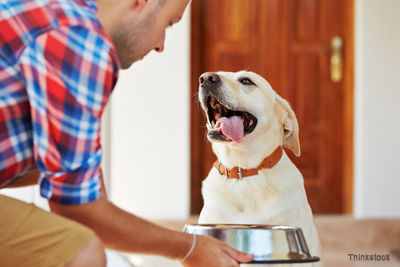
In the holiday movie “A Christmas Story,” the bumbling father played by Gavin McCloud walks into the kitchen only to see the neighbor’s dogs beat a hasty retreat — carrying the feast with them. While it’s a hilarious scene in the movie, it’s not one I would ever want to see in real life.
Pets may not always “get” the holidays, but we do know they are drawn to the delicious smells and tastes of a feast, even if it is a tofurkey. It’s for this reason, unfortunately, that emergency veterinarians find themselves with much more business over the holidays.
Holiday feasts are often marked by excess. People tend to eat until they are uncomfortable, and then, just maybe, have a bit more. Celebrations may also be accompanied by the distractions of guests, games, songs and preparations. Then there’s the dreaded clean-up. With so much going on, it’s important to be particularly cautious with your pets this time of year.
Common holiday food that could harm your dog
Because we want to share our holidays, and because it’s hard to resist those big eyes, we may carve off “just a bit” for the dog. Before you give in though, stop and think carefully.
Mostly, the food we eat, in small amounts, is not dangerous. Be aware, however, there are exceptions. The metabolism of dogs is considerably different from our own, and some pretty surprising things (frequently associated with holiday meals) can be toxic and even fatal:
Chocolate— The most famous of these dangers is chocolate, and for good reason. Chocolate can cause serious problems. Avoid this risk all together and never let your dog have any chocolate. Learn more about this danger here.
Xylitol— Holidays are a time for baking. Many are concerned about sugar in baked goods and some will use xylitol as a sugar substitute. Xylitol can cause severe drops in blood glucose levels for dogs, resulting in seizures, and in some cases, severe liver damage. Even a small exposure to xylitol can be deadly. Gum, mints and candy are likely sources, but xylitol can be found many places. Even just a few cookies or muffins have been known to cause toxicity and even death.
Unbaked bread dough— Bread dough that contains yeast can cause serious problems. The yeast may expand in your dog’s stomach, resulting in fermentation and leading to alcohol production.
Alcohol— Speaking of alcohol, be sure your dog does not have access to alcohol in any form but especially in sweet and attractive drinks. Alcohol can have many of the same acute results it does in people.
Onions and other bulbs— Onions and other bulbs including garlic, leeks and chives can be very toxic. The result can be signs from nausea to a severe form of anemia that, in extreme cases, can be fatal. These foods are toxic to dogs (and cats) weather they are cooked, raw or powdered. If they are part of your recipes, take precautions so that pets don’t eat the foods that include them.
Raisins and grapes— Raisins and grapes can also be toxic and cause severe vomiting that leads to kidney failure a day or so after ingestion.
Garbage— Do not consider your dog a garbage disposal. Their stomach and intestines are generally not accustomed to eating rich foods. Meat trimmings are often high in fat and can result in gastrointestinal problems as mild as “fullness” to vomiting and diarrhea and even to conditions as severe as pancreatitis.
Do not give your dog bones and turkey carcasses. Oh sure, they enjoy them, but broken and chipped teeth, bones lodged in their mouth and throat and impactions in the stomach and intestines can result in severe discomfort and sometimes a need for surgery. Those few moments of enjoyment can lead to serious problems later.
Tips for your dog at the holidays:
- Enjoy the day with your pet, but remember that moderation and precautions are the key. Provided your dog has no health problems, like a history of pancreatic or liver/intestinal problems, a slice of turkey is perfectly fine. Fatty foods should be avoided
- Avoid foods that contain the products above
- If your dog is seen eating anything toxic or exhibits any unusual signs, call your veterinarian or the veterinary emergency clinic. As always, early intervention reduces the chances of serious problems
- Do not leave your dog unattended. He might well raid the dinner before you do
- The surest way to avoid holiday food issues is with a simple rule. If you wouldn’t eat it, don’t let your dog eat it. That includes eating too much
If you have any questions or concerns, you should always visit or call your veterinarian -- they are your best resource to ensure the health and well-being of your pets.
